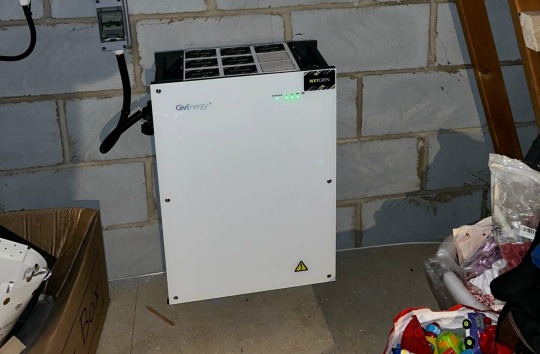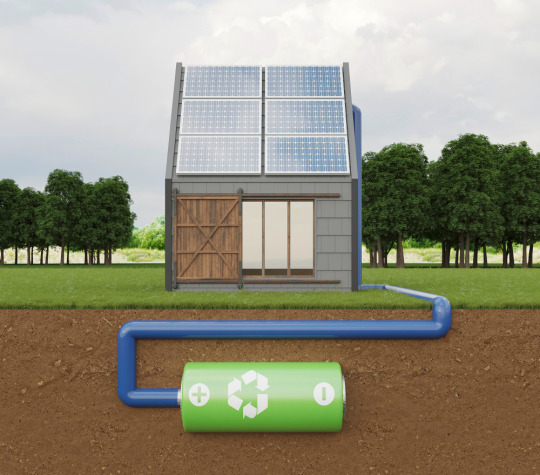#Battery Storage
Text
I think we all know that Governor Newsom wants to run for President in four years, so this publication might fall into the category of advance political campaigning. Yet, the achievement is notable.

22 notes
·
View notes
Text
#good news#environmentalism#science#nature#environment#usa#united states#solar power#batteries#battery storage#power storage
5 notes
·
View notes
Text
Home Energy Management and Storage System
FHP installs home battery storage system to monitor energy usage and budget. It's simple to install, maintain and operate to improve the safety and efficiency of home energy. Read More https://www.franklinwh.com/

2 notes
·
View notes
Text

Thinking about solar panels for your home but worried about storing the energy? ☀️
This article from NxtGen Energy explains how battery storage can maximize the value of your solar panel system! Read the full article here:
The Value Proposition of Battery Storage for Solar Panel Systems
Solar Battery Energy Storage Systems (BESS) allow you to:
Store excess solar energy during the day 🌞
Use it to power your home at night 🌃
Reduce your reliance on the grid ⚡
Potentially save money on your electricity bills 💷
Is solar with battery storage right for you? Head over to https://nxtgenenergy.co.uk to learn more!
#solar#solar energy#solar power#solar panels#solar pv#solar battery#solar batteries#battery storage#battery#essex#kent#london#uk
0 notes
Text
Understanding the Factors Behind Rapid Solar Battery Drainage
In the realm of renewable energy, solar power stands out as a beacon of sustainability, promising clean and efficient energy production. Solar batteries play a pivotal role in storing this energy for later use, ensuring a consistent power supply even when the sun isn't shining. However, if you've noticed your solar battery draining faster than expected, it can be a cause for concern. Let's delve into some common reasons behind rapid solar battery drainage.
System Overload
One of the primary reasons for swift battery drainage is system overload. If your solar setup is powering more devices or appliances than its capacity allows, the battery will drain faster to meet the demand. Adding more solar panels or increasing battery capacity can alleviate this issue.
Inefficient Battery
The efficiency of your solar battery plays a crucial role in its performance. Over time, batteries degrade due to usage, age, and environmental factors, leading to decreased efficiency. If you're experiencing rapid drainage, it could be a sign that your battery is reaching the end of its lifespan and may need replacement.

Faulty Components
Like any electrical system, solar setups can experience issues with individual components. Faulty wiring, malfunctioning charge controllers, or defective inverters can all contribute to increased energy loss and faster battery drainage. Regular maintenance and inspections can help identify and address these issues promptly.
Extreme Temperatures
Temperature fluctuations can significantly impact the performance of solar batteries. High temperatures can cause batteries to degrade faster, reducing their capacity and increasing drainage rates. Conversely, extremely cold temperatures can temporarily reduce battery efficiency, leading to quicker drainage until temperatures stabilize.
Parasitic Loads
Parasitic loads refer to devices or systems that draw power continuously, even when not in use. Common culprits include standby power in appliances, vampire loads from electronics, or poorly configured system settings. Identifying and minimizing parasitic loads can help conserve energy and extend battery life.
Inadequate Sunlight Exposure
Insufficient sunlight exposure can hinder the ability of solar panels to generate enough energy to recharge the battery fully. Factors such as shading from trees or nearby structures, cloudy weather, or improper panel orientation can all diminish solar energy production, leading to faster battery drainage during periods of low sunlight.
Improper Sizing
A crucial aspect of a solar power system is ensuring that it's appropriately sized to meet your energy needs. If your system is undersized relative to your energy consumption, the battery may drain quickly as it struggles to keep up with demand. Consulting with a professional to assess your energy requirements and system capacity can help prevent this issue.
Battery Chemistry
Different types of batteries have varying chemistries, each with its unique characteristics and performance metrics. Lead-acid, lithium-ion, and other battery chemistries offer different energy densities, discharge rates, and cycle lifespans. Choosing the right battery chemistry for your specific application can optimize performance and mitigate rapid drainage issues.
System Design Flaws
Poor system design or installation errors can exacerbate battery drainage problems. Issues such as improper wiring, inadequate ventilation for heat dissipation, or suboptimal placement of components can all contribute to inefficiencies and increased energy loss within the system.
User Behavior
Lastly, user behavior can also influence solar battery performance. Practices such as frequent deep discharges, improper charging habits, or neglecting maintenance can accelerate battery degradation and shorten its lifespan. Adopting energy-conscious habits and following manufacturer recommendations for usage and maintenance can help maximize battery longevity.
Conclusion
In conclusion, several factors can contribute to rapid solar battery drainage, ranging from system-related issues to environmental factors and user behavior. Identifying the underlying cause of the problem is crucial for implementing effective solutions and optimizing the performance of your solar power system. Regular maintenance, proper sizing, and attention to energy consumption habits can all contribute to prolonged battery life and enhanced overall system efficiency. By addressing these factors proactively, you can ensure that your solar battery operates optimally and continues to provide reliable renewable energy storage for years to come.
0 notes
Text
#Solar batteries#Batteries#Lithium ion batteries#Battery storage#Kehua batteries#Kehua Batteries Supplier#Battery Storage Solution in ghana
0 notes
Text
1 note
·
View note
Text
Solar Power 24/7 with Liquid Cooled Battery Storage
If you have already installed solar. Thinking of installing solar. You should defiantly add Liquid Cooled Battery Storage. Here's why.
Harness the full potential of your solar power – day or night – with Wincle’s liquid-cooled battery storage systems.
Why Solar + Battery Storage?
“Use It or Lose It” No More: Solar panels peak during the day, but often produce more energy than you need. Wincle stores that excess for later use or lets you sell it back to the grid at premium rates.
Power When You Need It: Stored solar energy…

View On WordPress
0 notes
Text
Use the SGIP Rebate to Save Even More on Batteries
California is a leader in energy storage thanks in large part to the Self-Generated Incentive Program (SGIP). By offering rebates that might offset thousands of dollars from your project, the program contributes to battery accessibility. This is especially true when combined with your solar installation and the Federal Investment Tax Credit (ITC).
For More info:- solar panels with battery storage
0 notes
Link

Excerpt from this story from Inside Climate News:
At some point, the development of solid-state batteries—in which electrons flow through a solid material instead of a liquid or gel—is going to lead to electric vehicles that can go much farther on a charge and battery-storage systems that can hold more energy while taking up less space. We just don’t know when that is going to be.
But in the last 10 days, two announcements offer reasons to think the answer is “sooner rather than later.”
First, Solid Power, a Colorado-based company developing solid-state EV batteries for partners including Ford and BMW, said it has completed installation of a “pilot production line” that is capable of making about 300 battery cells per week. This signals that the technology is now moving from the lab to the factory.
Second, University of Houston researchers published a paper showing how they have developed a glasslike material that is highly effective as an electrolyte—the part of a battery that electrons pass through during cycles of charging and discharging—for use in a sodium-sulfur battery for energy storage. The research is notable because this is a solid-state battery, and because it shows the promise of sodium-sulfur batteries as an alternative to lithium-ion batteries for long-duration energy storage.
17 notes
·
View notes
Text
A platform designed to simplify the process of investing in energy assets, offering users access to a variety of investment opportunities in oil & gas, solar farms, battery storage facilities, and more. The website emphasizes the benefits of including energy assets in investment strategies for enhancing performance opportunities across economic conditions. It provides features such as direct access to energy assets with transparency, low fees, fractional ownership, and the use of AI for improved investment decisions. Energia caters to both first-time investors and experienced financial advisors looking for passive income, diversification, and inflation hedging through energy investments.
#Energy Investments#Oil & Gas#Renewable Energy#Investment Platform#Fractional Ownership#Artificial Intelligence#Financial Diversification#Passive Income#Inflation Hedging#Solar Farms#Battery Storage
0 notes
Text
Finding the Best Solar Battery Storage
Finding the best solar battery storage requires evaluating various factors to meet your power needs reliably. These include storage capacity, power rating and warranty.
Battery longevity matters as well. Evaluate manufacturers’ projected lifespans and warranties to ensure they can stand the test of time. Quality manufacturers often offer 10-year/unlimited cycles warranties.
Type

When you pair your solar installation with battery storage, it can unlock a host of benefits including sidestepping peak fee periods, diminishing your dependence on the utility, harnessing energy after sundown, and ensuring power availability during outages. To maximize these advantages, it’s important to choose the best battery type for your lifestyle and budget.
There are four primary solar battery types to consider: lead acid, lithium ion, nickel cadmium, and flow batteries. Lithium ion batteries are the most popular choice among homeowners because they have high efficiencies, long lifespans, and low maintenance costs.
The most important factor to consider is the battery’s maximum capacity and usable capacity (each referred to as a “depth of discharge” rating). Ultimately, you’ll want to choose a battery with a large enough maximum capacity to ensure that your home will be able to run on solar energy all day and night. It’s also important to look at the round-trip efficiency of your battery, which represents how much energy is lost in the process of storing and using electricity.
Technology
Solar batteries store energy through a chemical reaction among battery components. Once charged, the battery will deliver power as needed when your system is generating less than you need. Historically, lead acid batteries have been the preferred choice for solar energy storage, but recent advances in lithium-ion battery technology have made them the new standard for residential solar storage solutions. Battery capacity and power ratings are important to consider when choosing a solar battery for your home. A higher capacity means that your batteries can back up more appliances at the same time and have a longer cyclic life.
Lithium batteries are most popular for residential solar energy storage systems because of their price, stability, and longevity. Lithium-ion home solar batteries come in two different configurations: lithium nickel manganese cobalt, or "LiNMC," and lithium iron phosphate, or "LiFePO4". Flow batteries, which use water-based zinc and bromine solution with vanadium, are also new entrants to the solar battery market.
Power Capacity
One of the most important considerations when shopping for solar batteries is their peak power capacity, which is measured in amp-hours. A battery rated at 100 amphours can output 1 ampere of electricity for 10 hours.
A high power capacity is essential for ensuring that your solar energy system can provide backup power during the evening and on cloudy days. The best solar batteries offer at least 10 kWh of storage, which can cover most of your household’s daily energy needs.
For solar systems with a size of 5kW or larger, we recommend choosing a battery that’s sized to match. This ensures that the battery is large enough to support your solar panels during a grid outage, while also providing backup power for essential appliances like a nebulizer. This is important because some equipment, such as medical devices, require a lot of energy and can quickly drain a battery. The Franklin Home Power and LG Chem batteries in our review are geared to work with solar systems of this size.
Warranty
Solar battery storage is a great addition to any home solar system. It helps you save energy by storing excess power generated on sunny days and provide backup power during power outages. However, there are a few things to consider when buying solar batteries.
The first thing you should look for is the warranty. Most solar battery manufacturers offer a product and performance warranty. The product warranty guarantees the quality of the solar battery, and the performance warranty ensures it will work to a certain level for 25 years.
Keep in mind that most warranty coverage excludes damage caused by accidents, product misuse/abuse, criminal activity and unforeseen catastrophic events. Also, installing the battery outside or within a short distance of saline water can also void your warranty. Lastly, most manufacturers will only repair or replace the batteries that were purchased from their certified network of retailers. This is because they want you to get the best possible service and performance from their products.
0 notes
Text

Did you know that solar battery storage is soon to be VAT-free in the UK? 🙌
Get all the details here: New Blog Post - No More VAT On Solar Battery Storage
This is great news for homeowners who want to save money on their energy bills, reduce their carbon footprint, and increase their energy independence. 💯
Solar battery storage allows you to store the excess electricity generated by your solar panels and use it whenever you need it. This means you can use more of the free and clean energy from the sun, and less of the expensive and dirty energy from the grid. ☀️
A typical three-bedroom home can save around £669 each year with a solar battery and solar panel system. That’s a lot of savings over the lifetime of your solar PV system! 💰
Plus, solar battery storage can also increase the value of your home, as more buyers are looking for eco-friendly and energy-efficient properties. 🏡
If you’re interested in installing solar battery storage for your home, you can get a free no-obligation quote from NXTGEN Energy on 01268 928 690 or visit NXTGEN Energy Ltd. They will help you find the best deal for your needs and budget. 😊
Don’t miss this opportunity to take advantage of the coming VAT exemption and the benefits of solar battery storage. Contact NXTGEN Energy today and start your journey to a greener and cheaper future. 🌱
#solar#solar energy#solar panels#solar power#solar pv#essex#battery#solar battery#battery storage#UK
1 note
·
View note
Text

If you are planning to get a Lithium-ion battery for your solar energy setups, contact Jubaili Bros today. We are in this field for many years and provide all kinds of solar energy solutions at affordable prices. For further information, you can visit our website.
#Solar batteries#Batteries#Lithium ion batteries#Battery storage#Battery Storage Solution in ghana#solar batteries uae
0 notes